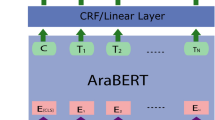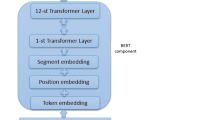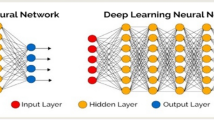Abstract
Arabic sentiment analysis is the process of computationally identifying and categorizing opinions expressed in a piece of text, particularly to assess whether the writer’s attitude toward a given topic, product, etc. is positive, negative, or neutral. In sentiment analysis, aspect category detection (ACD) attempts to identify the aspect categories mentioned in a sentence. Our study investigates the effects of transfer learning across several Arabic NLP tasks. We proposed a new shared DistilBERT model, which is a fine-tuned version of the basic DistilBERT. Our results demonstrate the outperforming of the proposed approach for the two tasks presented in the study, with a small variation. We also showed the limited effects of transfer learning on the performance of the proposed approach, particularly for highly dialectic comments.
Access this chapter
Tax calculation will be finalised at checkout
Purchases are for personal use only
Similar content being viewed by others
References
Mozafari, M., Farahbakhsh, R., Crespi, N.: A BERT-based transfer learning approach for hate speech detection in online social media. In: Cherifi, H., Gaito, S., Mendes, J.F., Moro, E., Rocha, L.M. (eds.) COMPLEX NETWORKS 2019. SCI, vol. 881, pp. 928–940. Springer, Cham (2020). https://doi.org/10.1007/978-3-030-36687-2_77
Bensoltane, R., Zaki, T.: Towards Arabic aspect-based sentiment analysis: a transfer learning-based approach. Soc. Netw. Anal. Min. 12, 1–16 (2022)
Chouikhi, H., Alsuhaibani, M.: Deep transformer language models for Arabic text summarization: a comparison study. Appl. Sci. 12(23), 11944 (2022)
Chouikhi, H., Alsuhaibani, M., Jarray, F.: BERT-based joint model for aspect term extraction and aspect polarity detection in Arabic text. Electronics 12(3), 515 (2023)
Al-Smadi, M., Qawasmeh, O., Talafha, B., Quwaider, M.: Human annotated Arabic dataset of book reviews for aspect based sentiment analysis. In: 2015 3rd International Conference on Future Internet of Things and Cloud, pp. 726–730. IEEE, August 2015
Pontiki, M., et al.: Semeval-2016 task 5: aspect based sentiment analysis. In: ProWorkshop on Semantic Evaluation (SemEval-2016), pp. 19–30. Association for Computational Linguistics (2016)
Al-Dabet, S., Tedmori, S., Mohammad, A.S.: Enhancing Arabic aspect-based sentiment analysis using deep learning models. Comput. Speech Lang. 69, 101224 (2021)
Gonnet, P., Deselaers, T.: Indylstms: independently recurrent LSTMs. In: ICASSP 2020–2020 IEEE International Conference on Acoustics, Speech and Signal Processing (ICASSP), pp. 3352–3356. IEEE, May 2020
Obaidat, I., Mohawesh, R., Al-Ayyoub, M., Mohammad, A.S., Jararweh, Y. Enhancing the determination of aspect categories and their polarities in Arabic reviews using lexicon-based approaches. In: 2015 IEEE Jordan Conference on Applied Electrical Engineering and Computing Technologies (AEECT), pp. 1–6. IEEE, November 2015
Tamchyna, A., Veselovská, K.: Ufal at semeval-2016 task 5: recurrent neural networks for sentence classification. In: Proceedings of the 10th International Workshop on Semantic Evaluation (SEMEVAL-2016), pp. 367–371, June 2016
Bensoltane, R., Zaki, T.: Comparing word embedding models for Arabic aspect category detection using a deep learning-based approach. In: E3S Web of Conferences, vol. 297, p. 01072. EDP Sciences (2021)
Heikal, M., Torki, M., El-Makky, N.: Sentiment analysis of Arabic tweets using deep learning. Procedia Comput. Sci. 142, 114–122 (2018)
Nabil, M., Aly, M., Atiya, A.: Astd: Arabic sentiment tweets dataset. In: Proceedings of the 2015 Conference on Empirical Methods in Natural Language Processing, pp. 2515–2519, September 2015
Alayba, A.M., Palade, V., England, M., Iqbal, R.: Arabic language sentiment analysis on health services. In: 2017 1st International Workshop on Arabic Script Analysis and Recognition (ASAR), pp. 114–118. IEEE, April 2017
Alayba, A.M., Palade, V., England, M., Iqbal, R.: A combined CNN and LSTM model for Arabic sentiment analysis. In: Holzinger, A., Kieseberg, P., Tjoa, A.M., Weippl, E. (eds.) CD-MAKE 2018. LNCS, vol. 11015, pp. 179–191. Springer, Cham (2018). https://doi.org/10.1007/978-3-319-99740-7_12
Abdul-Mageed, M., Diab, M., Korayem, M.: Subjectivity and sentiment analysis of modern standard Arabic. In: Proceedings of the 49th Annual Meeting of the Association for Computational Linguistics: Human Language Technologies, pp. 587–591, June 2011
Abdul-Mageed, M., Diab, M., Kübler, S.: SAMAR: subjectivity and sentiment analysis for Arabic social media. Comput. Speech Lang. 28, 20–37 (2014)
El-Beltagy, S.R., Khalil, T., Halaby, A., Hammad, M.: Combining lexical features and a supervised learning approach for Arabic sentiment analysis. In: Gelbukh, A. (ed.) CICLing 2016. LNCS, vol. 9624, pp. 307–319. Springer, Cham (2018). https://doi.org/10.1007/978-3-319-75487-1_24
Shoukry, A., Rafea, A.: A hybrid approach for sentiment classification of Egyptian dialect tweets. In: 2015 First International Conference on Arabic Computational Linguistics (ACLing), pp. 78–85. IEEE, April 2015
Al Sallab, A., Hajj, H., Badaro, G., Baly, R., El-Hajj, W., Shaban, K.: Deep learning models for sentiment analysis in Arabic. In: Proceedings of the Second Workshop on Arabic Natural Language Processing, pp. 9–17, July 2015
Baly, R., et al.: A characterization study of Arabic twitter data with a benchmarking for state-of-the-art opinion mining models. In: Proceedings of the third Arabic Natural Language Processing Workshop, pp. 110–118, April 2017
Baly, R., Hajj, H., Habash, N., Shaban, K.B., El-Hajj, W.: A sentiment treebank and morphologically enriched recursive deep models for effective sentiment analysis in Arabic. ACM Trans. Asian Low-Resour. Lang. Inf. Process. (TALLIP) 16(4), 1–21 (2017)
Devlin, J., Chang, M.W., Lee, K., Toutanova, K.: Bert: pre-training of deep bidirectional transformers for language understanding. arXiv preprint arXiv:1810.04805 (2018)
Rogers, A., Kovaleva, O., Rumshisky, A.: A primer in BERTology: what we know about how BERT works. Trans. Assoc. Comput. Linguist. 8, 842–866 (2021)
Zaib, M., Sheng, Q.Z., Emma Zhang, W.: A short survey of pre-trained language models for conversational AI-a new age in NLP. In: Proceedings of the Australasian Computer Science Week Multiconference, pp. 1–4, February 2020
Alshalan, R., Al-Khalifa, H.: A deep learning approach for automatic hate speech detection in the Saudi twitter sphere. Appl. Sci. 10(23), 8614 (2020)
Antoun, W., Baly, F., Hajj, H.: Arabert: transformer-based model for Arabic language understanding. arXiv preprint arXiv:2003.00104 (2020)
Safaya, A., Abdullatif, M., Yuret, D.: Kuisail at semeval-2020 task 12: bert-cnn for offensive speech identification in social media. In: Proceedings of the Fourteenth Workshop on Semantic Evaluation, pp. 2054–2059, December 2020
Inoue, G., Alhafni, B., Baimukan, N., Bouamor, H., Habash, N.: The interplay of variant, size, and task type in Arabic pre-trained language models. arXiv preprint arXiv:2103.06678 (2021)
Abdul-Mageed, M., Elmadany, A., Nagoudi, E.M.B.: ARBERT & MARBERT: deep bidirectional transformers for Arabic. arXiv preprint arXiv:2101.01785 (2020)
Chouikhi, H., Chniter, H., Jarray, F.: Arabic sentiment analysis using BERT model. In: Wojtkiewicz, K., Treur, J., Pimenidis, E., Maleszka, M. (eds.) ICCCI 2021. CCIS, vol. 1463, pp. 621–632. Springer, Cham (2021). https://doi.org/10.1007/978-3-030-88113-9_50
Chouikhi, H., Chniter, H., Jarray, F.: Stacking BERT based models for Arabic sentiment analysis. In: Proceedings of the 13th International Joint Conference on Knowledge Discovery, Knowledge Engineering and Knowledge Management - Volume 2: KEOD, pp. 144–150 (2021). https://doi.org/10.5220/0010648400003064, ISBN 978-989-758-533-3, ISSN 2184-3228
Sanh, V., Debut, L., Chaumond, J., Wolf, T.: DistilBERT, a distilled version of BERT: smaller, faster, cheaper and lighter. arXiv preprint arXiv:1910.01108. (2019)
Mohammad, A.S., Qwasmeh, O., Talafha, B., Al-Ayyoub, M., Jararweh, Y., Benkhelifa, E.: An enhanced framework for aspect-based sentiment analysis of hotels’ reviews: Arabic reviews case study. In: 2016 11th International Conference for Internet Technology and Secured Transactions (ICITST), pp. 98–103. IEEE, December 2016
Al-Smadi, M., Talafha, B., Al-Ayyoub, M., Jararweh, Y.: Using long short-term memory deep neural networks for aspect-based sentiment analysis of Arabic reviews. Int. J. Mach. Learn. Cybern. 10, 2163–2175 (2019)
Elnagar, A., Khalifa, Y.S., Einea, A.: Hotel Arabic-reviews dataset construction for sentiment analysis applications. In: Shaalan, K., Hassanien, A.E., Tolba, F. (eds.) Intelligent Natural Language Processing: Trends and Applications. SCI, vol. 740, pp. 35–52. Springer, Cham (2018). https://doi.org/10.1007/978-3-319-67056-0_3
Aly, M., Atiya, A.: LABR: A Large Scale Arabic Book Reviews Dataset. Meetings of the Association for Computational Linguistics (ACL) At: Sofia, Bulgaria (2013)
Alomari, K.M., ElSherif, H.M., Shaalan, K.: Arabic tweets sentimental analysis using machine learning. In: Benferhat, S., Tabia, K., Ali, M. (eds.) IEA/AIE 2017. LNCS (LNAI), vol. 10350, pp. 602–610. Springer, Cham (2017). https://doi.org/10.1007/978-3-319-60042-0_66
Saidi, R., Jarray, F.: Sentence transformers and DistilBERT for Arabic word sense induction. In: Proceedings of the 15th International Conference on Agents and Artificial Intelligence, vol. 3, pp 1020–1027 (2023). ISBN 978-989-758-623-1. ISSN 2184-433X
Saad, M.K., Ashour, W.: Osac: open source Arabic corpora. In: 6th ArchEng International Symposiums, EEECS, vol. 10, November 2010
Author information
Authors and Affiliations
Corresponding author
Editor information
Editors and Affiliations
Rights and permissions
Copyright information
© 2023 The Author(s), under exclusive license to Springer Nature Switzerland AG
About this paper
Cite this paper
Chouikhi, H., Jarray, F. (2023). Sh-DistilBERT: New Transfer Learning Model for Arabic Sentiment Analysis and Aspect Category Detection. In: Nguyen, N.T., et al. Advances in Computational Collective Intelligence. ICCCI 2023. Communications in Computer and Information Science, vol 1864. Springer, Cham. https://doi.org/10.1007/978-3-031-41774-0_22
Download citation
DOI: https://doi.org/10.1007/978-3-031-41774-0_22
Published:
Publisher Name: Springer, Cham
Print ISBN: 978-3-031-41773-3
Online ISBN: 978-3-031-41774-0
eBook Packages: Computer ScienceComputer Science (R0)




